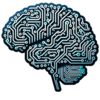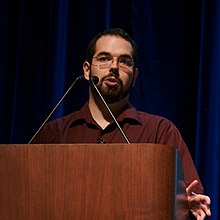The technological singularity—or simply the singularity—is a hypothetical future point in time at which technological growth becomes uncontrollable and irreversible, resulting in unforeseeable consequences for human civilization. According to the most popular version of the singularity hypothesis, I. J. Good's intelligence explosion model of 1965, an upgradable intelligent agent could eventually enter a positive feedback loop of self-improvement cycles, each successive; and more intelligent generation appearing more and more rapidly, causing a rapid increase ("explosion") in intelligence which would ultimately result in a powerful superintelligence, qualitatively far surpassing all human intelligence.

Eliezer S. Yudkowsky is an American artificial intelligence researcher and writer on decision theory and ethics, best known for popularizing ideas related to friendly artificial intelligence. He is the founder of and a research fellow at the Machine Intelligence Research Institute (MIRI), a private research nonprofit based in Berkeley, California. His work on the prospect of a runaway intelligence explosion influenced philosopher Nick Bostrom's 2014 book Superintelligence: Paths, Dangers, Strategies.

Nick Bostrom is a philosopher known for his work on existential risk, the anthropic principle, human enhancement ethics, whole brain emulation, superintelligence risks, and the reversal test. He was the founding director of the now dissolved Future of Humanity Institute at the University of Oxford and is now Principal Researcher at the Macrostrategy Research Initiative.
Singularitarianism is a movement defined by the belief that a technological singularity—the creation of superintelligence—will likely happen in the medium future, and that deliberate action ought to be taken to ensure that the singularity benefits humans.
Artificial general intelligence (AGI) is a type of artificial intelligence (AI) that matches or surpasses human cognitive capabilities across a wide range of cognitive tasks. This contrasts with narrow AI, which is limited to specific tasks. Artificial superintelligence (ASI), on the other hand, refers to AGI that greatly exceeds human cognitive capabilities. AGI is considered one of the definitions of strong AI.
A superintelligence is a hypothetical agent that possesses intelligence surpassing that of the brightest and most gifted human minds. "Superintelligence" may also refer to a property of problem-solving systems whether or not these high-level intellectual competencies are embodied in agents that act in the world. A superintelligence may or may not be created by an intelligence explosion and associated with a technological singularity.
The Machine Intelligence Research Institute (MIRI), formerly the Singularity Institute for Artificial Intelligence (SIAI), is a non-profit research institute focused since 2005 on identifying and managing potential existential risks from artificial general intelligence. MIRI's work has focused on a friendly AI approach to system design and on predicting the rate of technology development.

An AI takeover is an imagined scenario in which artificial intelligence (AI) emerges as the dominant form of intelligence on Earth and computer programs or robots effectively take control of the planet away from the human species, which relies on human intelligence. Possible scenarios include replacement of the entire human workforce due to automation, takeover by a superintelligent AI (ASI), and the notion of a robot uprising. Stories of AI takeovers have been popular throughout science fiction, but recent advancements have made the threat more real. Some public figures, such as Stephen Hawking and Elon Musk, have advocated research into precautionary measures to ensure future superintelligent machines remain under human control.
Recursive self-improvement (RSI) is a process in which an early or weak artificial general intelligence (AGI) system enhances its own capabilities and intelligence without human intervention, leading to a superintelligence or intelligence explosion.
Differential technological development is a strategy of technology governance aiming to decrease risks from emerging technologies by influencing the sequence in which they are developed. Using this strategy, societies would strive to delay the development of harmful technologies and their applications while accelerating the development of beneficial technologies, especially those that offer protection against harmful technologies.
The ethics of artificial intelligence covers a broad range of topics within the field that are considered to have particular ethical stakes. This includes algorithmic biases, fairness, automated decision-making, accountability, privacy, and regulation. It also covers various emerging or potential future challenges such as machine ethics, lethal autonomous weapon systems, arms race dynamics, AI safety and alignment, technological unemployment, AI-enabled misinformation, how to treat certain AI systems if they have a moral status, artificial superintelligence and existential risks.
In the field of artificial intelligence (AI) design, AI capability control proposals, also referred to as AI confinement, aim to increase our ability to monitor and control the behavior of AI systems, including proposed artificial general intelligences (AGIs), in order to reduce the danger they might pose if misaligned. However, capability control becomes less effective as agents become more intelligent and their ability to exploit flaws in human control systems increases, potentially resulting in an existential risk from AGI. Therefore, the Oxford philosopher Nick Bostrom and others recommend capability control methods only as a supplement to alignment methods.
Machine ethics is a part of the ethics of artificial intelligence concerned with adding or ensuring moral behaviors of man-made machines that use artificial intelligence, otherwise known as artificial intelligent agents. Machine ethics differs from other ethical fields related to engineering and technology. It should not be confused with computer ethics, which focuses on human use of computers. It should also be distinguished from the philosophy of technology, which concerns itself with technology's grander social effects.

Our Final Invention: Artificial Intelligence and the End of the Human Era is a 2013 non-fiction book by the American author James Barrat. The book discusses the potential benefits and possible risks of human-level (AGI) or super-human (ASI) artificial intelligence. Those supposed risks include extermination of the human race.

Superintelligence: Paths, Dangers, Strategies is a 2014 book by the philosopher Nick Bostrom. It explores how superintelligence could be created and what its features and motivations might be. It argues that superintelligence, if created, would be difficult to control, and that it could take over the world in order to accomplish its goals. The book also presents strategies to help make superintelligences whose goals benefit humanity. It was particularly influential for raising concerns about existential risk from artificial intelligence.
Instrumental convergence is the hypothetical tendency for most sufficiently intelligent, goal-directed beings to pursue similar sub-goals, even if their ultimate goals are quite different. More precisely, agents may pursue instrumental goals—goals which are made in pursuit of some particular end, but are not the end goals themselves—without ceasing, provided that their ultimate (intrinsic) goals may never be fully satisfied.
Existential risk from artificial intelligence refers to the idea that substantial progress in artificial general intelligence (AGI) could lead to human extinction or an irreversible global catastrophe.
Some scholars believe that advances in artificial intelligence, or AI, will eventually lead to a semi-apocalyptic post-scarcity and post-work economy where intelligent machines can outperform humans in almost every, if not every, domain. The questions of what such a world might look like, and whether specific scenarios constitute utopias or dystopias, are the subject of active debate.

Human Compatible: Artificial Intelligence and the Problem of Control is a 2019 non-fiction book by computer scientist Stuart J. Russell. It asserts that the risk to humanity from advanced artificial intelligence (AI) is a serious concern despite the uncertainty surrounding future progress in AI. It also proposes an approach to the AI control problem.
Roko's basilisk is a thought experiment which states that an otherwise benevolent artificial superintelligence (AI) in the future would be incentivized to create a virtual reality simulation to torture anyone who knew of its potential existence but did not directly contribute to its advancement or development, in order to incentivize said advancement. It originated in a 2010 post at discussion board LessWrong, a technical forum focused on analytical rational enquiry. The thought experiment's name derives from the poster of the article (Roko) and the basilisk, a mythical creature capable of destroying enemies with its stare.







